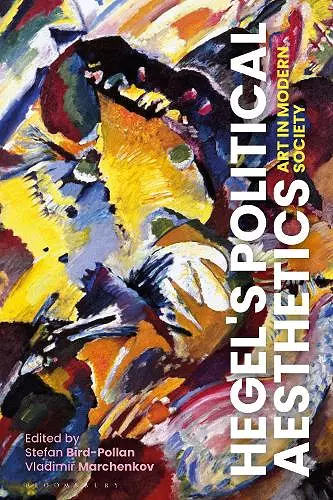Hegel's Political Aesthetics
Art in Modern Society
Stefan Bird-Pollan editor Vladimir Marchenkov editor
Format:Paperback
Publisher:Bloomsbury Publishing PLC
Published:21st Oct '21
Should be back in stock very soon

A rigorous examination of the relationship between art and politics in Hegel’s thinking, with a specific focus on the role of art in modern ethical life.
What is the role of art in modern society? To what extent are the beautiful and the morally good intertwined? Hegel's Political Aesthetics explores Hegel’s take on these ever-relevant philosophical questions and investigates three key themes: art’s contribution to modern ethical life, the loss of art’s authority in modern ethical life and ways of thinking beyond Hegel’s analysis of art’s role in society. The aesthetic is explored through the lens of German Idealism from Kant to Hegel, ultimately placing ethics and morality at the forefront of this debate.
The authors explore Hegel’s take on Kant’s conception by historicizing what it means to be responsible to others, which for Hegel means being free within the norms of society, within what he calls ethical life. As a set of concrete social arrangements designed for finite human beings, however, ethical life falls short of actualizing freedom absolutely.
The themes in this volume are motivated by a central ambivalence in Hegel’s thinking about modernity. The question of freedom sits at the forefront of this text, alongside the relation between art and the spirit. This book will be of particular interest to philosophers of aesthetics, politics and ethics.
Dedicated to exploring art in modern Western society, this excellent volume does indeed both instruct and delight: it instructs with lucid accounts of Hegel’s work on art and will surely delight those seeking a deeper understanding of Hegel’s aesthetic and its enduring relevance. * CHOICE *
This book ranges widely among Hegel’s historical, theoretical, and political pronouncements about art, uniting them beautifully under the innovative theme of political aesthetics. The essays are invigorating and fresh, showing how much Hegel’s synthetic approach to art can illuminate chronic dilemmas about art and its place in our political and moral lives. A wonderful contribution to new scholarship on Hegel’s philosophy of art. * Lydia Moland, Associate Professor of Philosophy, Colby College, USA *
Modern culture continues to be riven by the question of the meaning of the arts: are the arts bound by the demands of morality and the urgencies of political strife; or are the arts somehow autonomous, somehow posed in an aesthetic space with its own inner logic, historical trajectory, and normative demands? In this splendid and always engaging collection of essays, each of the authors critically reflects on Hegel’s effort to demonstrate the always extra-aesthetic significance of the arts that are nonetheless possessed of a defining aesthetic meaning as sensuous particulars. The very best of these uniformly excellent essays are incisive additions to both our understanding of Hegel and contemporary cultural debates.
Belongs on the shelf of every student of Hegel.
ISBN: 9781350279179
Dimensions: unknown
Weight: 349g
248 pages